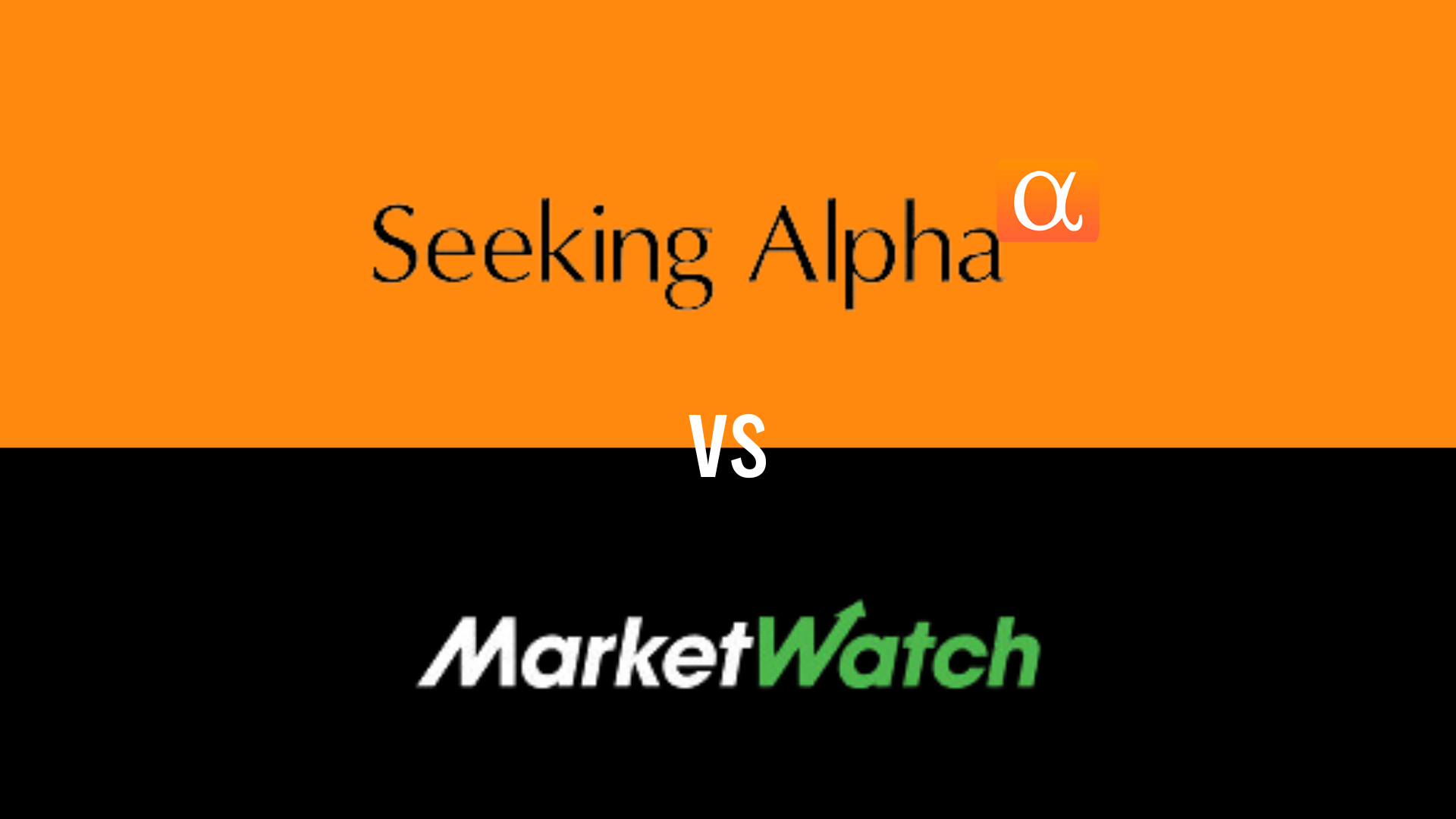There’s more than one way to research investments. Some investors prefer to keep an eye on the market, getting the information they need from up-to-the-minute news on stock movements and changes. Others prefer the deep-dive approach, digging into the numbers and reviewing financials, ratings, and other metrics before making investment decisions.
Two research platforms you may want to consider are Seeking Alpha and MarketWatch. Each offers investors a different approach to research and a different set of features to get the job done. It’s important to understand each platform before you invest your money in the cost of a premium service.
In this article, we’ll provide our Seeking Alpha vs MarketWatch comparison, with information about key features and which platform is best suited to your investment and research preferences. By the time you’ve finished reading, you’ll know what to expect from both MarketWatch and Seeking Alpha and be ready to make a decision.
What is MarketWatch?
To compare MarketWatch vs Seeking Alpha, let’s start with MarketWatch and some key information about the platform and what it offers.
MarketWatch is a subsidiary of Dow Jones & Company, which is itself owned by News Corporation. The company also owns and publishes Barron’s and the Wall Street Journal.
The MarketWatch website first launched in 1997 and was acquired by Dow Jones & Company in January of 2005.
The core offerings of MarketWatch include financial news, market data, stock quotes, analysis, and investment insights.
Key Features of MarketWatch
MarketWatch offers a limited set of features compared to Seeking Alpha. Some of the most important features include the following:
- Real-time stock data and quotes
- News coverage on global markets, companies, and industries
- Financial analysis from professionals
- Access to charts, tools, and calculators to track investments
What MarketWatch specializes in is providing subscribers with real-time data to make investment decisions. It offers some analysis, but not at the same depth or volume as Seeking Alpha.
What is Seeking Alpha?
Seeking Alpha got its start back in 2004, when it was founded by a former Morgan Stanley technology analyst named David Jackson. It has partnerships with MarketWatch, CNBC, MSN, and The Street, among others.
Simply stated, Seeking Alpha is an investment community that uses a crowdsourced model for investment research, opinions, and analysis. Subscribers get access to articles and research from expert analysts, along with research and portfolio management tools and crowdsourced opinions from other Seeking Alpha users.
Key Features of Seeking Alpha
Seeking Alpha users get access to a broad array of features that include analysis, research, and tools. Here are some of the most important features.
- User-generated articles by investors, analysts, and financial professionals
- Stock ratings, including “Bullish” and “Bearish” ratings from contributors, Wall Street Analysts’ ratings, and Seeking Alpha’s proprietary Quant ratings.
- Portfolio management features
- Premium subscription services for detailed stock analysis and earnings forecasts
- Discussion forums for investor engagement
Seeking Alpha is designed for use by investors at all levels who want access to as much data and analysis as possible to help them make informed investment decisions.
Pro Tip:
If you sign up with Seeking Alpha Premium today, you will receive $30 off and access to an exclusive 7-day free trial!
Head-to-Head Comparison
It can be difficult to compare stock research services when you’re not already a subscriber. We’ve created this table to help you understand the key features of Seeking Alpha and MarketWatch, the user focus of each, and the type of content you can expect to find.
| Factor | Seeking Alpha | MarketWatch |
| User Focus | Intermediate to advanced investors, and anyone looking for detailed analysis and robust tools to research investments and stay on top of changes in their portfolio. | Casual investors and those who prefer to make investment decisions based on up-to-the-minute market news. |
| Type of Content | In-depth stock analysis, Quant ratings, expert-written articles, community-created content, and news. There’s a huge variety of high-quality content for research and analysis. | Timely financial news, market data, and accessible research tools. It’s easy to access news across industries and indices, including the S&P 500, DJIA, and Nasdaq. |
| Tools and Research | Research tools available include Quant ratings, stock ratings, and author ratings; dividend grades; content from community members and professionals; portfolio management tools including customizable views and portfolio grades; newsletters; a short ideas portal; and an idea screener. | Real-time market data including performance of an array of benchmarks; custom watchlists; research tools; investment articles by MarketWatch’s top analysts; and stock simulation games. Access to historical analysis and articles may help with research. |
| Best for | Intermediate and advanced investors who are interested in doing in-depth research and want access to a gigantic pool of analysis, including pro and community opinions, Quant ratings, and financials. | Casual or beginner investors who want to stay dialed in to market news and updates. |
Which Platform is Best for You?
Now that you’ve got the facts, let’s explore which platform is best for you and your investment preferences and needs.
Best for Beginner Investors
Beginner investors may not be comfortable digging through a high volume of research and analysis, particularly if they’re not knowledgeable about stock metrics and how to read financial statements.
For that reason, these investors – as well as those with only a casual interest in the stock market – may prefer MarketWatch.
It offers some research tools, most of which are linked to market news and not necessarily to in-depth resources of information such as an individual company’s financials.
Beginners who don’t mind a bit of a learning curve may also benefit from choosing Seeking Alpha.
Pro Tip:
If you sign up with Seeking Alpha Premium today, you will receive $30 off and access to an exclusive 7-day free trial!
Best for Experienced Investors
Experienced investors and intermediate investors, as well as portfolio managers and serious traders who have some knowledge about investment metrics and a desire to get access to as much data and information as possible. are more likely to prefer Seeking Alpha to MarketWatch.
Seeking Alpha offers 10 years of financials for publicly traded companies, plus a huge library of analysis from both investment experts and community members.
Users also get access to Seeking Alpha’s widely-respected Quant ratings and advanced screening and portfolio management tools. These include Portfolio Grades, custom portfolio views, and custom screeners with hundreds of metrics to choose from.
Rate of Returns and Investment Strategies
Neither Seeking Alpha nor MarketWatch is a stock picking site. That said, both provide information that could be perceived as recommendations, whether direct or not.
Let’s start with Seeking Alpha. Its Quant ratings use metrics including value, growth, profitability, EPS revisions, and price momentum to assign each investment a rating between 1 and 5. A Quant Rating of 1 is considered a Strong Sell and a Quant Rating of 5 is considered a Strong Buy.
Seeking Alpha has provided a comparison of the performance of Strong Buy stocks compared to the S&P 500. A hypothetical investor who put $10,000 into the S&P 500 back in 2010 would have increased their portfolio to $57,416 by 2024. By contrast, an investor who bought Seeking Alpha “Strong Buy” rated stocks would have $278,192. That’s nearly 5x the return!
It’s impossible to evaluate MarketWatch by the same metrics because there’s no way to know which articles or analysis an investor might read when making investment decisions. Since MarketWatch doesn’t have proprietary ratings, we can’t make a true comparison to Seeking Alpha.
Overall, Seeking Alpha’s premium content is best suited to help long-term investors with a passion for research, while MarketWatch provides free and low cost real-time updates that are most useful for short-term traders.
Conclusion: Which Platform is Right for You?
The primary differences between MarketWatch and Seeking Alpha have to do with the depth of information available and which type of investor is most likely to benefit from their various features.
Seeking Alpha comes with a premium price tag, but offers far more in the way of useful information to help investors evaluate investments and make smart decisions. Their Quant ratings are highly regarded for a reason, and investments with Strong Buy ratings have strongly outperformed the S&P 500 benchmark.
MarketWatch has some useful free content and a low cost for subscription services. It’s best suited for casual news followers and people who prefer to make investment choices based on up-to-the-minute market news.
Pro Tip:
If you sign up with Seeking Alpha Premium today, you will receive $30 off and access to an exclusive 7-day free trial!
FAQs
Which is better for stock analysis: MarketWatch or Seeking Alpha?
The answer depends on what type of stock information you prefer. If you’re seeking news and up-to-date market updates and analysis, MarketWatch may be preferable. On the other hand, investors who prefer data-driven, in-depth analysis will be best served by the huge array of analysis and data that’s available through Seeking Alpha.
Which platform offers better stock recommendations?
MarketWatch doesn’t offer stock recommendations. Individual articles may provide recommendations but it’s mostly a news service. Seeking Alpha’s recommendations comes in the form of its Quant “Strong Buy” Ratings, which have historically outperformed the S&P 500.





